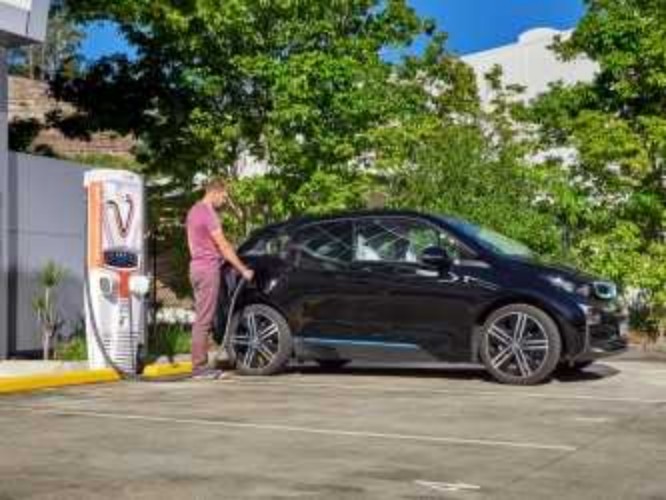Australian supplier of electric vehicle chargers, Tritium, will double the UK’s number of EV “bowsers” by 2025, in a substantial deal signed with UK-based Box Energi to supply its e-mobility service provider Drive Energi with one to two 50kW Veefil-RT DC rapid chargers at each of 2,500 sites.
The first 100 new Drive Energi sites are expected to be operational in the UK by the end of January 2020, and will boast Tritium Veefil-RT 50kW DC Rapid Chargers which add 50 kilometres of range in 10 minutes of charging.
“These chargers are not only the fastest and most advanced in their class, but incredibly easy to use,” said James Moat, CEO of Drive Energi which aims to eliminate range anxiety for EV drivers in the UK by developing a nationwide network of recharging locations in publicly available sites and on private sites providing charge points for vehicle fleets.
At 75 cm by 33 cm, the Veefil-RT footprint is the smallest of commercially available EV-chargers in the world, which Moat says makes it easy to deploy, “particularly in our cities and high-density areas where space is increasingly limited”.
EV drivers in the UK can currently plug into around 2,300 rapid chargers across 1,500 sites. This new contract will make Tritium, which has sales and manufacturing facilities in Brisbane, Amsterdam and the US, the biggest charge enabler of UK EV ambitions.
Earlier this year, London began taxing vehicles driving within its Ultra Low Emission Zone (ULEZ) — from Finsbury in the north to Vauxhall Bridge in the south, from Paddington Station in the west to Tower Bridge in the east — if they don’t meet stringent emissions standards, as do electric vehicles. Cities such as Bath, Birmingham and Greater Manchester have similar plans to reduce vehicle-driven pollution, which create further incentives for EV uptake.
As ULEZ-type schemes take hold across the nation, “The need for reliable, smart and easy-to-use charging infrastructure is critical,” said Kevin Pugh, Development Manager for Tritium in the UK and Ireland.

Image: Tritium
Tritium has its origins in the successful solar-car racing of its founders in the late 1990s, at the University of Queensland in Brisbane. Twenty years on, the team, now Tritium CEO, David Finn, the company’s Chief Product Officer, Paul Sernia, and Chief Technology Officer, James Kennedy, remains “passionate about renewable energy for transport and electric vehicles”, as declared on its website.
Tritium was founded in 2001 to sell the company’s Gold Controller motor inverter for solar-powered vehicles, and Tritium continues to develop and manufacture a range of solar racing-car products. Its first DC fast charger for electric vehicles was commercially launched in 2014.
In the UK, it’s estimated that 20 minutes of charging on the latest Veefil-RT will add three days of range to an EV, given that the average daily commute is around 32 kilometres, says Pugh.
Drive Energi’s rollout of Tritium chargers will be among the largest DC rapid-charging networks in a single country, and will enhance the confidence of UK drivers that they can easily find a charger whenever they need one.
It’s a step up from the expectations of current 7 kW chargers typically found in UK homes and some publicly accessible charging sites, which enable about 14 km of driving for every 20 minutes of charging.
Tritium will also supply 24/7 support to the Drive Energy network, facilitated by the fact that each charger has an integrated modem that streams constant performance data to Tritium’s support engineers.
In Australia, Tritium customers include NRMA, Chargefox and Evie Networks. Tritium Veefil charge stations currently make up 78% of the 89 DC fast chargers installed in Australia.
In a statement following the inking of the Drive Energi deal, Tritium management said the development was well timed to take advantage of its new and upgraded state-of-the-art E-Mobility Innovation Centres in Brisbane and Amsterdam.
This content is protected by copyright and may not be reused. If you want to cooperate with us and would like to reuse some of our content, please contact: editors@pv-magazine.com.









1 comment
By submitting this form you agree to pv magazine using your data for the purposes of publishing your comment.
Your personal data will only be disclosed or otherwise transmitted to third parties for the purposes of spam filtering or if this is necessary for technical maintenance of the website. Any other transfer to third parties will not take place unless this is justified on the basis of applicable data protection regulations or if pv magazine is legally obliged to do so.
You may revoke this consent at any time with effect for the future, in which case your personal data will be deleted immediately. Otherwise, your data will be deleted if pv magazine has processed your request or the purpose of data storage is fulfilled.
Further information on data privacy can be found in our Data Protection Policy.